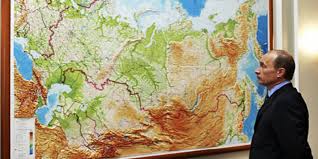By Kevork Almassian
Vienna Security Round Table „Security Policy Challenges for Europe in 2023“
In 2014, I was an anchor and producer in a media outlet in Lebanon. Back then, my direct manager was the Professor of International Relations and expert on geopolitics, Prof. Jamal Wakim. When the Obama/Biden administration engineered a coup d’état in Kiev, Wakim told me that “if World War Three is about to happen, it is going to start in Ukraine.”
I started dig in to understand the cored of the conflict and why Ukraine is important and in 2015, I had the opportunity to travel to Donetsk to see with my own eyes.
I want to summarize the struggle over Ukraine in one word, it is going to be Eurasia.
The Eurasian project was first elaborated by the Brits and the U.S. adopted the ideals of this project after emerging as a superpower in the aftermath of WW2.
In order to establish and keep its hegemonic status over Eurasia, the priority of the U.S. has been and still is to block any sort of unity or political and economic integration of the Eurasian mainland under the leadership of one power.
Hence the American focus was on blocking the aspirations of Russia or China to become a leading power in Eurasia. However, by observing the development in the current war in Ukraine, it seems Russia and China came to the conclusion that they cannot end America’s hegemony over Eurasia individually. That’s why, we are witnessing rapid integration of Russian and Chinese political and economic efforts, and probably military integration in the future to end U.S.’s supremacy over Eurasia.
In the geopolitical mindset of the U.S., if a unity is established in the Eurasian mainland under the leadership of Moscow and Beijing, it will first isolate Great Britain and then the U.S. from their Eastern hemisphere.
This U.S. geopolitical understanding was elaborated by the American geopolitical theorist Nicholas J. Spykman whose ideas were inspired by the Mongol Empire in the 13th and 14th centuries which conquered most of the Eurasian mainland and stretched between Far East Asia and all the way to Anatolia and then finally to Hungary and Poland.
With the supremacy of the Mongolian empire on Eurasia, western civilization came under direct threat. Since then, western decision makers are trying to avoid a Mongolian style unity in the Eurasian mainland that may threaten the West.
Nowadays, attempts of Eurasian unity outside the U.S. umbrella stands on three pillars: Russia, China and Iran.
One of the steps toward a Eurasian unity is the Shanghai Cooperation Organization in 1996 which covers around 60% of Eurasia. And with Iran’s full membership process which started in 2021 to the SCO, the three pillars of Eurasia have been completed.
Now, let’s talk about NATO which was formed after WW2 as a military alliance that aims at defeating the Soviet Union and forcing it to retreat from East Germany and Eastern Europe.
After the collapse of the USSR, against the promise of James Baker to Gorbachev, NATO expanded Eastward especially in former Soviet countries all the way to the borders with current day Russia.
The U.S. isolation attempts against first the USSR and then Russia didn’t stop in Eastern Europe. Let’s remember, the U.S. supported the mujahideen in Afghanistan in late 70s and in the 80s. It was Brzezinski’s idea to drag the USSR into a costly war in Afghanistan which eventually led to the collapse of the Soviet block and the Soviets retreated from Afghanistan.
Afghanistan’s geography was important for the U.S. because it gives Washington the perfect location to project its power in Kazakhstan, one of Russia’s biggest southern neighbors.
In addition, the U.S. supported the radical in Chechnya and other central European countries to further isolate Russia.
This package of American steps was all meant against the USSR and later Russia.
Let’s finally address Ukraine which I believe is the most important geopolitical conflict in our modern times because it represents one of the four bridges that include France, Germany and Poland. This bridge gives the U.S an access to the hearth of the world.
On the other hand, Russia without Ukraine becomes a regional power and loses its European dimension according to Brzezinski.
That’s why, Ukraine joining the NATO or becoming a de-facto NATO state is a red line for Russia because Ukraine will become the starting base to project U.S.’s power into the heart of the world.
Russia also believes if Ukraine becomes NATO or a client state for the U.S., the latter can project its power inside Russia and trigger internal conflicts and seek the Balkanization of the Russian Federation.
Based on this geopolitical context, we now understand why the U.S. engineered a coup in Kiev in 2014 and supported the neo-Nazi battalions there:
- To control Ukraine and get an access to the heart of the world.
- To block Russia’s access to the black sea.
- To draw a line in Ukraine to block further economic integration of Russian and German economies, because in Brzezinski’s thoughts, nothing threatens the U.S. hegemony over Eurasia and eventually over the world than a Russian-German conglomeration.
In conclusion, I believe if Russia with its energy resources and manpower come together with Germany’s technology and industry, it will represent a huge challenge to the U.S. as the region will develop and be self-sufficient, and hence there will be no need for NATO’s protection of Germany. And this is something the U.S. cannot tolerate. That’s why Biden ordered the bombing of Nord Stream pipelines, according to veteran investigative journalist Seymour Hersh.

